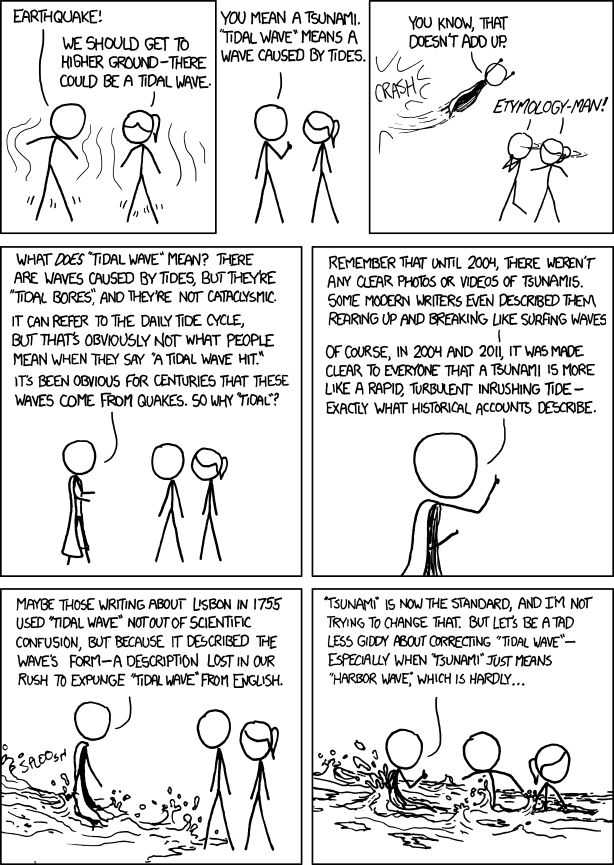Etymology-Man

'I can't believe I'm saying this, but I wish Aquaman were here instead--HE'D be able to help.'

'I can't believe I'm saying this, but I wish Aquaman were here instead--HE'D be able to help.'
This comic was followed two comics later by 1012: Wrong Superhero. This comic is a take on the traditional appearance of a superhero when a disaster strikes. In this case, Etymology-Man arrives, who apparently has the power of Etymology, the study of the history of words, their origins, and how their form and meaning have changed over time. As Etymology-Man is explaining the history of the words "tsunami" and "tidal wave", referencing the 2004 Indian Ocean tsunami, the 2011 Tōhoku tsunami and the 1755 Lisbon earthquake and tsunami, the water starts rising around them. As the waters continue to rise, he continues to only explain the words, rather than attempting to save them as a superhero should. This, intentionally or unintentionally, is a dig at academics who prefer to talk about issues when taking action is more appropriate.
Etymology-Man's explanation in the comic focuses on the historical and linguistic reasons for the use of the term "tidal wave" instead of "tsunami." While "tidal wave" is often corrected as a misnomer, Etymology-Man argues that its historical usage may not have been entirely misguided. He points out that early accounts of large waves, such as those from the 1755 Lisbon earthquake and tsunami, described their behavior as resembling a rapid and turbulent tide rather than a breaking wave. This distinction aligns with modern understandings of tsunamis as inrushing surges of water rather than surf-like waves. The 1755 Lisbon earthquake and tsunami devastated much of Lisbon and other coastal regions, with eyewitness accounts describing the ocean withdrawing and then rushing back violently, which could have influenced the term "tidal wave" to describe this tidal-like phenomenon. Etymology-Man suggests that instead of being rooted in scientific confusion, "tidal wave" might have been a descriptive term reflecting the wave's observable form. Furthermore, he notes that before the 2004 Indian Ocean tsunami and the 2011 Tōhoku tsunami, clear photographic or video evidence of tsunamis was rare. This lack of visual records likely contributed to misconceptions about their appearance, with some imagining tsunamis as tall, surfable waves. The widespread coverage of these modern events clarified that tsunamis are more like fast-moving, chaotic floods, further validating historical descriptions that likened them to tides. Etymology-Man's argument underlines the importance of understanding linguistic evolution and context, suggesting that the rush to replace "tidal wave" with "tsunami" might have overlooked the historical accuracy of the former term in certain respects. While he acknowledges that "tsunami" is now the accepted term, his lecture encourages a nuanced view of language history, even in the face of imminent danger.
Also, the title text is a play on how useless Aquaman is (perceived to be) compared to other superheroes, as his powers — breathing underwater, speed swimming, and communicating with sea life — are very difficult for writers to make relevant, since most stories do not take place underwater.[citation needed] Indeed, in the case of a flood, Aquaman and his aquatic allies would be able to assist with evacuations. (Some depictions of Aquaman do not have control of water itself. Though when equipped with his mystical trident, or magical prosthetic "water hand", could probably also perform useful hydrokinesis to avert significant damage.)
The irony of the situation comes from the fact that Etymology-Man seemingly has the power of flight and could in fact save Cueball and Ponytail if he was not so busy talking about the origin of the word "tidal wave".
Inexplicable is the fact that Cueball and Ponytail both know exactly who this "superhero" is, and ergo presumably realize that what he is telling them is useless, but they don't even attempt to get to safety. There are few possible explanations for this: perhaps they are simply accepting their fate instead of trying to escape, or even that learning cool word facts takes precedence over saving their own lives, or they have been distracted by Etymology-Man's lecture and were caught by surprise by the fast tidal wave.